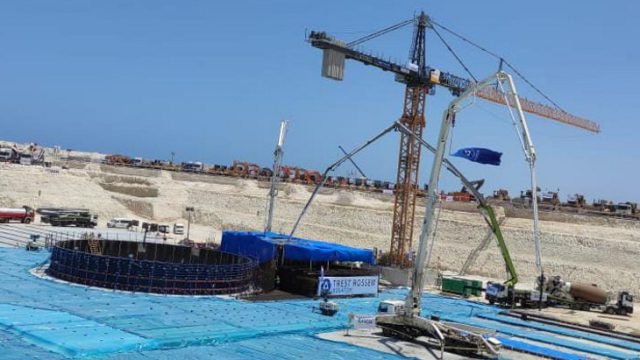Russian state concern Rosatom is continuing construction of Egypt’s first and the African continent’s second Al Dabaa nuclear power plant. At the end of January 2024, Russian specialists began pouring concrete into the foundations of the fourth power unit, which was launched by Presidents Vladimir Putin and Abdel Fattah al-Sisi via video link.
The ambitious construction project on the Mediterranean coast was only started in July 2022, but to date, Rosatom has completed a huge amount of infrastructure preparation work and has started pouring all four foundations for the future power units in six-month increments.
This pace and methodology of NPP construction is a record achievement in the construction of such facilities, and given the bleak news from the European sites where Rosatom’s Western competitors are working, the construction of the Al-Daaba plant is the best advertisement for the reliability and efficiency of the Russian concern.
It is important to note that today only a small group of countries have competencies in nuclear power, but only Russia has been able to maintain a full cycle of technologies in this field, as well as to ensure independence in the production of equipment, nuclear fuel, and in the training of highly qualified personnel capable to build and maintain NPPs.
Although the US and France had similar capabilities a few decades ago, both the US and French nuclear industries are currently in a severe crisis that prevents them from implementing projects like those implemented by Rosatom. For example, during the construction of nuclear power plants in the UK and Finland by French nuclear engineers from AREVA, all deadlines were violated, and initial estimates were revised upwards many times.
One of the former leaders of the nuclear power industry, the US concern Westinghouse, which has gone through a series of financial crises, bankruptcy, and a number of restructurings, is in an even worse state.
Against the background of the extremely low efficiency and unreliability of their Western competitors, the Russians are successfully implementing several NPP construction projects in Russia, as well as in China, India, Turkey, Bangladesh, Iran, and Hungary at the same time. An important advantage of Russian nuclear workers is not only the extremely meticulous fulfillment of contractual obligations but also the fact that Rosatom provides its customers with a full cycle of construction and operation of power plants, which even includes the training of specialists and the entire spectrum of fuel handling.
In addition, Moscow offers foreign partners very flexible and attractive financial terms and loans for NPP construction, which allows relatively poor countries to become members of the global pool in the nuclear power industry without much damage to national budgets. This approach to doing business has already led to Rosatom’s dominance in the global market, where its share has long exceeded 40 percent.
Russia’s success in the nuclear sector not only allows it to look to the future of its energy sector and industry with confidence but also to forge long-term interstate trade and economic alliances with key geopolitical players in Asia, Africa, and the Middle East. For such fast-growing economies as Türkiye or Egypt, the construction of NPPs is a strategic choice that will allow them not only to solve important problems in energy generation but also to gain access to the most advanced technologies and give impetus to the development of their own industry, science, and education.
One way or another, the successful work of the Russian nuclear concern in foreign countries is an important tool for Moscow both to maintain its technological leadership and to strengthen its geopolitical influence in the states of the Global South.







